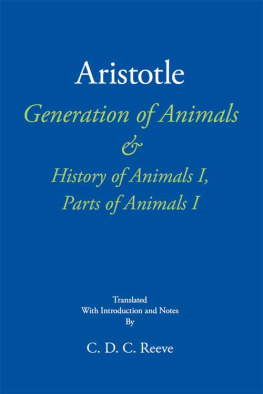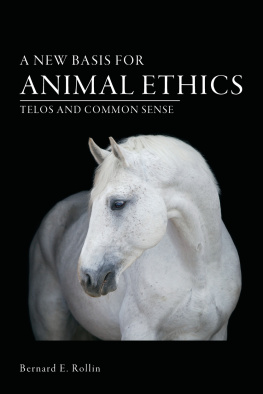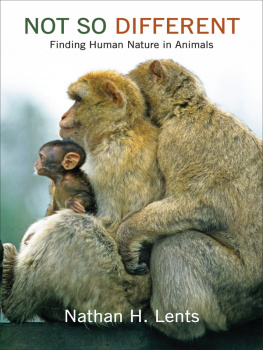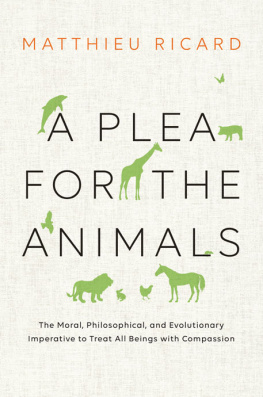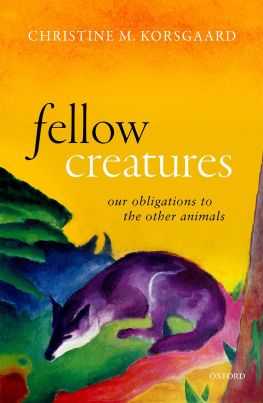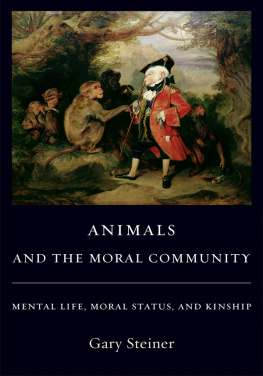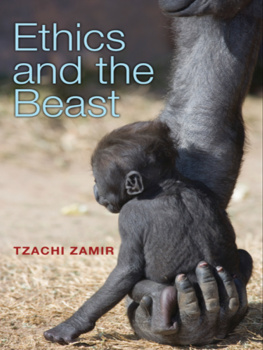Can Animals Be Moral?
Mark Rowlands
(p.iv) 
- Oxford University Press is a department of the University of Oxford.
- It furthers the University's objective of excellence in research,
- scholarship, and education by publishing worldwide.
- OxfordNew York
- AucklandCape TownDar es SalaamHong KongKarachi
- Kuala LumpurMadridMelbourneMexico CityNairobi
- New DelhiShanghaiTaipeiToronto
- With offices in
- ArgentinaAustriaBrazilChileCzech RepublicFranceGreece
- GuatemalaHungaryItalyJapanPolandPortugalSingapore
- South KoreaSwitzerlandThailandTurkeyUkraineVietnam
- Oxford is a registered trademark of Oxford University Press in the UK and certain other countries.
- Published in the United States of America by Oxford University Press
- 198 Madison Avenue, New York, New York 10016
- Oxford University Press 2012
- All rights reserved. No part of this publication may be reproduced,
- stored in a retrieval system, or transmitted, in any form or by any means,
- without the prior permission in writing of Oxford University Press,
- or as expressly permitted by law, by license, or under terms agreed with the
- appropriate reproduction rights organization. Inquiries concerning
- reproduction outside the scope of the above should be sent to the
- Rights Department, Oxford University Press, at the address above.
- You must not circulate this work in any other form and you must impose this same condition on any acquirer.
- Library of Congress Cataloging-in-Publication Data
- Rowlands, Mark.
- Can animals be moral? / Mark Rowlands.
- p.cm.
- ISBN978-0-19-984200-1 (alk. paper)
- 1.EthicsHistory.2.Animals (Philosophy)
- 3.Emotions in animals.4.Animal psychology.I.Title.
- BJ1031.R692012
- 179.3dc232011051638
- 135798642
- Printed in the United States of America
- on acid-free paper
Dedication
(p.v) For Emma (p.vi)
Contents
(p.ix) Preface
When I became a father for the first time, at the rather ripe old age of forty-four, various historical contingencies saw to it that my nascent son would be sharing his home with two senescent canines. There was Nina, an incontrovertibly ferocious German shepherd / malamute cross, and Tess, a wolf-dog mix who, though gentle, had some rather highly developed predatory instincts. I was a little concerned about how the new co-sharing arrangements were going to work. As it turned out, I neednt have worried at all. During the eighteen months or so that their old lives overlapped with that of my son, I was alternately touched, shocked, amazed, and dumbfounded by the sorts of care, solicitude, toleration, and patience they exhibited toward him. They would follow him from room to room, everywhere he went in the house. Crawled on, dribbled on, kicked, elbowed, and kneed: these occurrences were all treated with a resigned fatalism. The fingers in the eye they received on a daily basis would be simply shrugged off with an almost Zen-like calm. In many respects they were a better parent than I. If my son so much as squeaked in the middle of the night, I would instantaneously feel two cold noses pressed against my face: get up, you negligent parentyour son needs you!
(p.x) To someperhaps to manythis is an unpromising way to start this book. Discussing animals with this sort of naked, shameless affection is a fault that will almost certainly lead to anthropomorphism and other cardinal sins of that ilk. When we talk about animals, in any serious academic sense, we must be appropriately dispassionate. There is game that is played when animals are discussed in a philosophical or scientific context. The game is: dont give them anything more than you absolutely have to. Cognitive abilitiesassume only the bare minimum required to explain their behavior. Emotional sensibilitiesditto. Above all else: dont get attached to them. Many assume that, as far as animals are concerned, this is the only game in town. I disagree. But I am more than willing to play the game. Thus, when the book begins in earnest, I assure you I shall be more clinical, more sterile.
So, I thought I had better get mention of Nina and Tess out of the way early on. But I did have to mention them. After all, credit where credit is due. Care, solicitude, toleration, and patience are, ostensibly, moral emotions. At least, when they are attributed to humans we have little hesitation that in supposing that they are moral emotionsemotions that have identifiable moral content. And so it was, during those foggy, sleepless nights of my early fatherhood that the idea for this book started to grow slowly within me. Nina and Tess are both dead a few years now, but live on in this book. My thanks to both of them.
While I am on the subject of credit that is due, I would like to acknowledge my enormous intellectual debt to the work of, in purely alphabetical order, Marc Bekoff and Frans de Waal. On occasion, in the pages to follow, I shall criticize some of their claims and arguments. But these are the sorts of disagreements it is possible to have only with someone with whom one agrees on so very much. Without their groundbreaking work, this book would not have been written.
(p.xi) The question, Can animals be moral? is one that has, among philosophers at least, engendered an almost blanket denial. There are exceptions, but they are few and far between. This is curious, for addressing the question quickly plunges one into some of the central issues, problems, and, more significantly for my purposes, disputes of philosophy. In attempting to address this question in any serious way, one quickly becomes enmeshed, enveloped, and frequently bedazzled by some of the most difficult debates in philosophy: free will, autonomy, normativity, consciousness, self-consciousness, rationality, motivation, action, the nature and status of moral properties, and many more. Each of these topics has, of course, engendered a multiplicity of profoundly opposed views, endorsed by deeply entrenched opponents. It is, in many ways, odd that a near universal dismissal of the possibility of moral action in animals should emerge from this sort of widespread disharmony.
It is not remotely possible, in a work of this sort, to do all theseor even anyof these topics justice. It is certainly not possible to dig too many people out of camps in which they have become very comfortableoften for good reasons. Instead, I have restricted myself to two goals. First, I try to show that the blanket dismissal of the possibility of moral action in animals cannot be sustained because it rests on certain assumptions that are controversial and would be rejected by many, often the majority, of philosophers. Essentially, the blanket dismissal requires that one be willing to pitch one's tent in certain philosophical campscamps in which many, perhaps most, philosophers would not be seen dead. Second, and equally important, I shall try to show that there are indeed good reasons to eschew these camps. Of course, I harbor no illusions that this book will be the last word on the question of whether animals can act for moral reasons. But if I have done my job properly, it will at least be a word.
I presented the central arguments of this book at various venues, including the Indiana University, Yale University, the University of (p.xii) Chicago, and the biennial conference of the Spanish Society for Ethics and Political Philosophy. I would like to thank all involved parties for an opportunity to try out these arguments. In particular, my thanks go to Colin Allen, Gary Ebbs, Radhika Govindrajan, Kirk Ludwig, Martha Nussbaum, Timothy OConnor, Antonio Casado da Rocha, Sandra Shapshay, and Allen Wood. Thanks also to Colin McGinn and Daniel Hampikian for useful comments.


